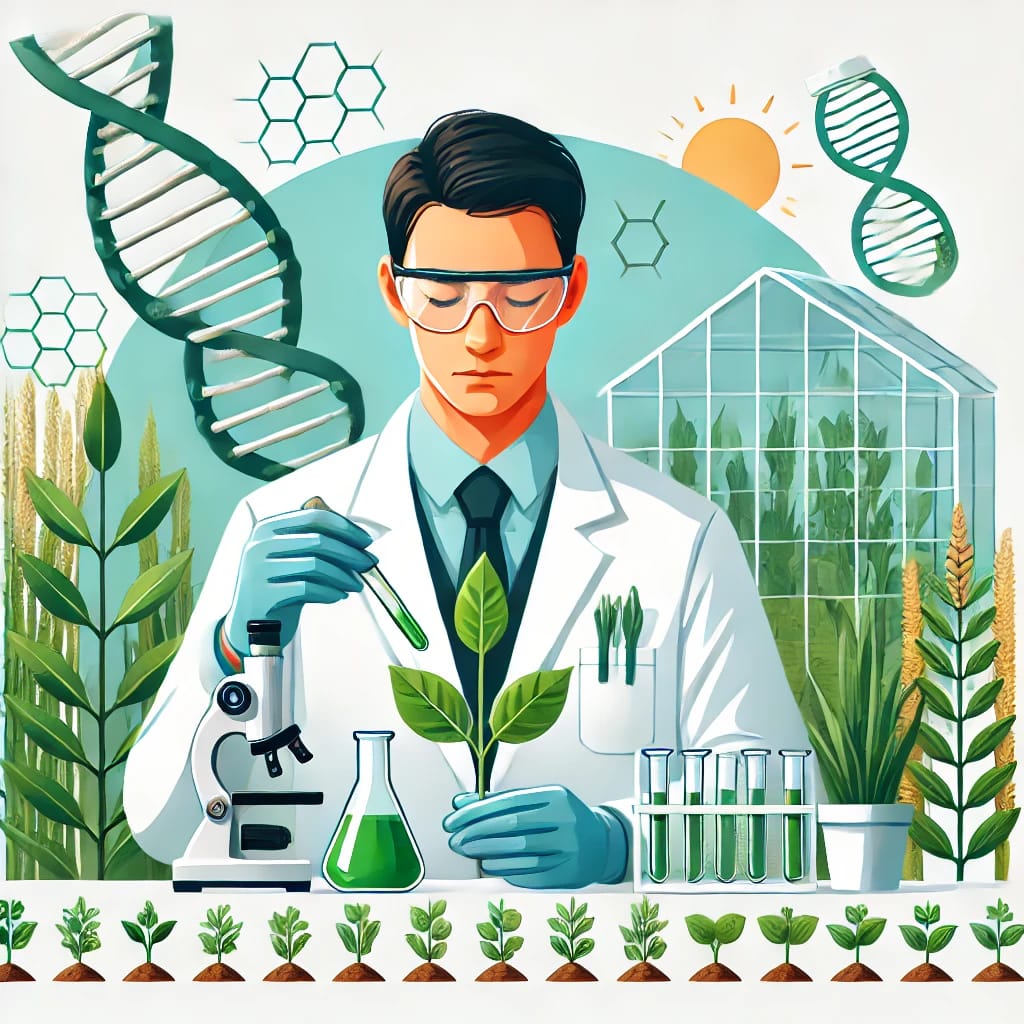Agricultural Biotechnologist

What is an Agricultural Biotechnologist ?

An Agricultural Biotechnologist is a professional who applies biotechnological techniques to improve agricultural processes, increase crop yield, enhance disease resistance, and develop more sustainable farming practices. They use genetic engineering, molecular biology, and other scientific methods to modify plants, animals, and microorganisms for agricultural purposes. Their work often involves research and development in areas like genetically modified crops, pest-resistant plants, and sustainable agricultural practices.
Education Eligibility

To become an Agricultural Biotechnologist, you typically need the following educational qualifications:
Bachelor’s Degree: A degree in Agricultural Science, Biotechnology, or a related field like Biochemistry, Microbiology, or Genetics is required.
Master’s Degree (optional): A Master’s in Agricultural Biotechnology, Plant Biotechnology, or a similar program may be required for advanced research or roles.
Doctorate (optional): A PhD can open doors to specialized research or academic positions.

Handicapped Eligibility
Persons with disabilities are generally eligible to pursue a career as an Agricultural Biotechnologist, provided they meet the minimum educational requirements. Specific eligibility rules vary by institution, but many universities offer special provisions and accommodations for students with disabilities, such as extra time during exams, accessible classrooms, and assistive technologies.
Admission Process

The admission process to become an Agricultural Biotechnologist typically involves:
- Application Form: Submitting an application to universities or colleges offering related programs.
- Merit-Based or Entrance Exam: Admission may be based on academic performance (high school grades for bachelor’s, or undergraduate scores for master’s) or through entrance exams.
- Documents: Proof of previous education, ID proof, photographs, and sometimes recommendation letters or a statement of purpose.

Entrance Exam
Entrance exams for agricultural biotechnology programs are commonly held by universities or national agencies. Some of the common exams include:
- JEE Main/Advanced (for engineering-based biotechnological courses)
- ICAR (Indian Council of Agricultural Research) exam for agricultural courses in India.
- GATE (Graduate Aptitude Test in Engineering) for post-graduate biotechnology programs.
- State-level Agricultural Exams: Depending on the country or region, there may be state-level exams that are part of the admission process.
Colleges and Universities

Some of the top institutions that offer courses related to Agricultural Biotechnology include:
- India:
- Indian Agricultural Research Institute (IARI)
- National Dairy Research Institute (NDRI)
- Tamil Nadu Agricultural University (TNAU)
- University of Agricultural Sciences (UAS)
- USA:
- University of California, Davis
- University of Illinois
- Cornell University
- UK:
- University of Edinburgh
- University of Warwick
- Other International Universities: Wageningen University (Netherlands), University of Sydney (Australia).

Scholarships
Various scholarships and financial aid options are available for students pursuing Agricultural Biotechnology:
- Government Scholarships: National and state-level scholarships, especially for students from economically disadvantaged backgrounds.
- Institutional Scholarships: Many universities offer merit-based and need-based scholarships.
- Private Scholarships: Agricultural organizations and private institutions may offer funding for specific research areas within biotechnology.
- International Scholarships: Offered by organizations such as the United Nations, or government-funded programs like Erasmus.
Time and Expenses in Agricultural Biotechnology
- Time: A bachelor’s degree typically takes 3 to 4 years. A master’s can take an additional 2 years, while a PhD can take 3-5 years depending on the research.
- Expenses: Tuition fees vary, but they can range from $5,000 to $30,000 annually depending on the country and institution. Additional costs include lab fees, textbooks, and research materials. Scholarships and financial aid can help reduce these costs.
Average Income
-
The average salary of an Agricultural Biotechnologist varies based on experience, location, and job role:
- Entry-Level: Around $30,000 – $45,000 annually.
- Mid-Level: Around $50,000 – $70,000 annually.
- Experienced Professionals: Around $80,000 – $100,000 or more, depending on the industry and specialization.
Growth in Career
The career growth for Agricultural Biotechnologists is quite promising due to the increasing demand for sustainable farming solutions, improved crop varieties, and food security. Potential growth areas include:
- Advanced Research: In academic, governmental, or private research institutions.
- Private Sector: Working in biotech companies that focus on agriculture, food production, and pharmaceuticals.
- Consultancy: Providing expertise to agricultural organizations or government bodies.
- Teaching: Becoming a professor or lecturer in agricultural science and biotechnology.
Specialist Roles
Some specialist roles within Agricultural Biotechnology include:
- Plant Biotechnologist: Focuses on plant breeding and genetic modification to improve crop traits.
- Molecular Biotechnologist: Works on genetic engineering and gene editing techniques.
- Agricultural Microbiologist: Focuses on the microbial world, including soil and crop microbiomes.
- Bioprocess Engineer: Works on large-scale production of bio-based products.
- Food Biotechnologist: Develops new food products and processes, including genetically modified organisms (GMOs).
Scope in Government and Private Sector
Government Sector:
- Research Organizations: Government agencies like the Indian Council of Agricultural Research (ICAR), Agricultural Research Service (ARS) in the US, and other governmental agricultural bodies often employ agricultural biotechnologists for research and policy development.
- Regulatory Bodies: Roles in overseeing the safety and approval of GMOs and biotechnology-based products.
Private Sector:
- Biotech Firms: Companies specializing in agricultural biotech, such as Monsanto, Syngenta, and Bayer, employ professionals in various capacities.
- Farming Corporations: Large agricultural companies that implement biotechnology to improve crop yields and sustainability.
Special Eligibility for Persons with Disabilities
- Disability-Related Provisions: Many institutions and governments offer specific provisions such as extra time for exams, accessible study materials, and assistance in lab work for students with disabilities. Specific eligibility criteria will depend on the institution and local regulations, but students with disabilities are often encouraged to apply and may receive accommodations for their needs.

